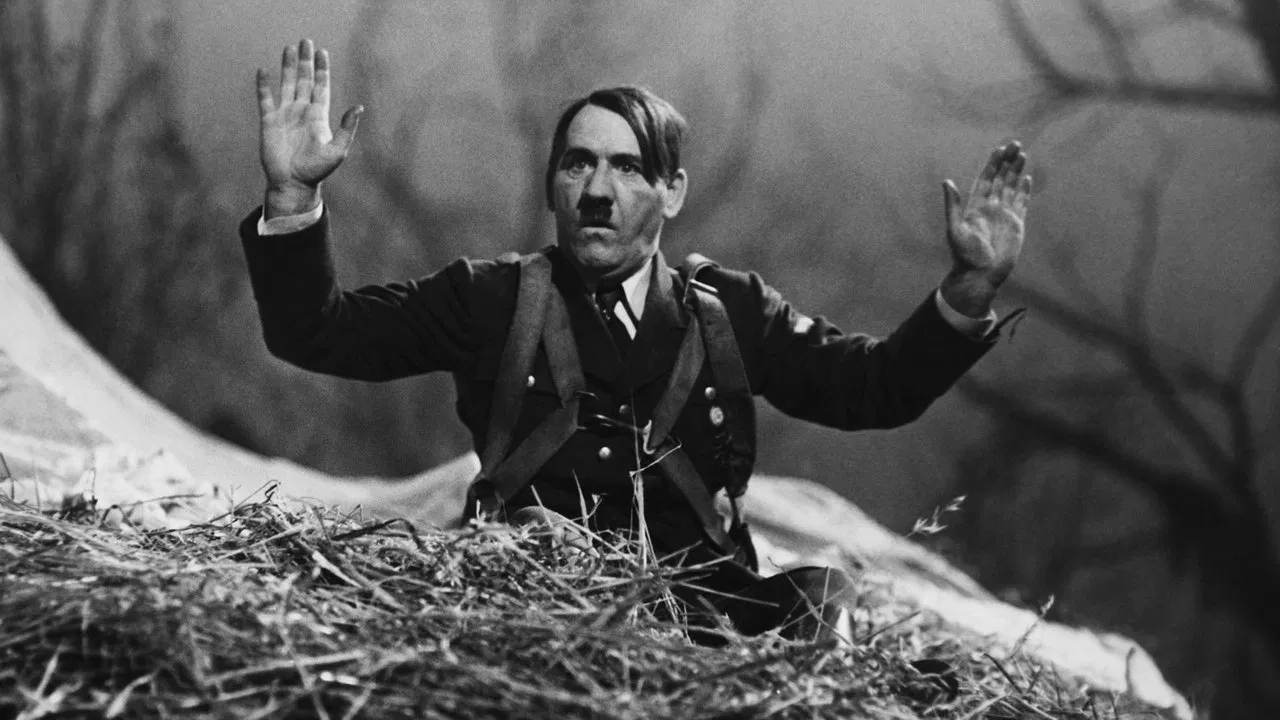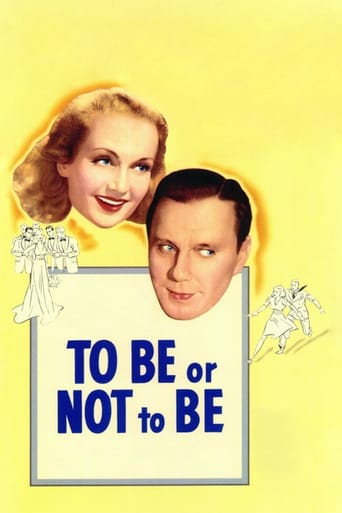

Better Late Then Never
... View MoreI didn’t really have many expectations going into the movie (good or bad), but I actually really enjoyed it. I really liked the characters and the banter between them.
... View MoreStory: It's very simple but honestly that is fine.
... View MoreBy the time the dramatic fireworks start popping off, each one feels earned.
... View MoreIn celebrating the 75th anniversary of the release of Casablanca, it is easy to overlook another anti-Nazi film, Ernst Lubitsch's "screwball" comedy To Be or Not To Be, a film that skewered the Nazi cause with equal effectiveness. While not as dramatic or filled with memorable lines and patriotic songs, To Be or Not To Be, like Casablanca, the film features two main Hollywood stars, Carole Lombard and Jack Benny and a love triangle in which romance must be subordinate to a greater cause. Set in Poland just before the German invasion of September 1, 1939, the film opens as a mustachioed man bearing a close resemblance to German Chancellor Adolf Hitler is seen walking alone in the streets of Warsaw.This Hitler, however, turns out to be the actor Bronski (Tom Dugan), a bit-player impersonating the Fuhrer in a play being put on by a Polish theatrical group. Is Hitler "by any chance interested in Mr. Maslowski's delicatessen?" teases the narrator in the opening segment. "That's impossible—he's a vegetarian!" Responding to all the "Heil Hitler" salutes, Bronski asserts "Heil myself" as he walks through an open door. Bronski is playing a secondary role to the famous Polish actor Josef Tura, played by Jack Benny, then a radio star whose trademark straight face and deadpan humor marks the film.Tura's wife Maria, also a popular Polish actress, is played by Carole Lombard who was to meet a shocking death in a plane crash in January, 1942 shortly after the film was completed. In the film, Maria is two-timing her actor husband by romancing a young flyer Lt. Sobinski (Robert Stack) who falls "head over heels" for the actress. The running gag in the film is that whenever Josef is playing Hamlet and delivers the line, "to be or not to be," it is a signal for Sobinski to get up from his seat in the theater and go backstage to meet Maria in her dressing room. It appears that Tura is more upset about his speech being interrupted than what happens behind the curtain.The sudden Nazi invasion, however, puts all romantic trysts on the back burner and the mood shifts to solemn. The plot now becomes more involved with espionage and patriotism than acting when Sobinski, now a pilot for the Royal Air Force, discovers that respected Polish professor Siletski (Stanley Ridges) is a double-agent working for the Nazis. When the Lieutenant returns to Warsaw to eliminate the traitorous professor, Maria and Josef team up to help by launching an elaborate charade to trick the unsuspecting Nazis. While the film takes its name from the famous line in Hamlet, Shylock's monologue from the Merchant of Venice, spoken in front of Nazi swastikas, is recited by Jewish actor Felix Bressart, "Have we not eyes? Have we not hands, organs, senses, dimensions, attachments, passions?" he asks the Nazis, "If you poison us, do we not die?" It is a noteworthy plea for tolerance in the days of rabid anti-Semitism even though the line "Hath not a Jew eyes?" is not spoken. According to Thomas Doherty writing in Tablet magazine, "the word "Jew" was seldom heard on the Hollywood screen, even in war-minded scenarios where the topic of anti-Semitism was front and center." He also quotes film historian Lester D. Friedman saying that "The studio bosses were always—even at this point—afraid of thrusting Jews into the spotlight." Whatever the reason, To Be or Not to Be is marked with the genius of one man, the great Jewish director Ernst Lubitsch who said, "What I have satirized in this picture are the Nazis and their ridiculous ideology," and that the tone and temper of the film "cannot leave any doubt in the spectator's mind what my point of view and attitude are toward these acts of horror." While the film is a broad and biting satire, from the beginning of production in November 1941 to its completion on December 24th, however, events made sure that To Be or Not to Be, as well as Charles Chaplin's The Great Dictator, was no longer a laughing matter.
... View MoreThis cinematic satire, directed by Ernst Lubitsch, contains some excellent acting--especially by its leads, Jack Benny and Carole Lombard. Its story is clever and funny. Lubitsch certainly earns, again, our respect for his directorial skills.But regardless of the talents on display in "To Be or Not To Be", this is a film that should be seen for its place in history.Just two years before its release, Chaplin gave the world the wonderful film "The Great Dictator", a tour de force spoof of Hitler. And it was very successful. It found an appreciative audience in the early days of the world conflict."To Be or Not To Be" did not receive the same warm welcome, mostly due its place in the chronology of its time:First: The film is shotThen: Pearl Harbor is attacked, bringing the United States into the war.Then: Carole Lombard dies in a plane crash while supporting the American war effort.Then: The film, edited and completed, is released.Obviously the pall of Carole Lombard's death hung over the film. How difficult would it be to laugh at a film under those circumstances? Then consider the tremendous stresses of a country just entering a global conflict on multiple fronts--relatives going off to war, families trying to find a new balance, the challenges of a nationwide effort to reindustrialize, the profound shift in economics on a national scale, the fear of military enemies whose motives and methods seemed somewhat unfathomable.Looking back now, it is easier to enjoy this film, even though we have a much greater understanding of the horrible realities of Hitler's plans. Though our viewpoint is clouded with wistfulness, this film deserves to be celebrated, especially for the performances of Benny and Lombard, which are seminal in the careers of both artists.
... View MoreInterestingly, when the serious and tragic theme of the Second World War used as the basis for a great comedy. From this point of view it is difficult to separate the horrors in people's lives and the way that fashioned this comedy. Comedy based on the tragedy is not entirely correct thesis. TO BE OR NOT TO BE is extremely brave, required and great project. The title is not a parody phrase from Shakespeare's works, but alluding to the existence and struggle for survival.Frivolous and inappropriate descriptions are that only correspond to the characteristics of the genre. Hilarious fun theater company in Warsaw trying to outwit the Nazis during the war. This is enough to man peed with laughter. Not pertinent, but it is necessary.The film can be seen as shocking joke, making fun of the Nazi approach and spectacle, but certainly not anti - Polish propaganda. The characters in the film do not cease to be what they are. They are actors. With good acting, improvisation, ingenuity and courage, winning terrible enemy.Carole Lombard as Maria Tura, an actress in Nazi-occupied Poland was a brave woman, an actress whom everyone admired, and we all know that the charm of a woman can be a powerful tool. The funny thing is in the film, no one can "break" other than her husband. Although, it is in this case quite helpless. Jack Benny as Joseph Tura, an actor and Maria's husband. He is "the first line" of ridicule. Uncertain is in itself and turns a fool several times. But in the end he shows to us his "great acting". Robert Stack as Lt. Stanislav Sobinski, a Polish airman in love with Maria is a handsome soldier and lover required in the script. Felix Bressart as Greenberg and Sig Ruman Col. Ehrhardt are hilarious. One wants a role because it is only created for her and the other for their mistakes "that can not be counted" always blame his servant.To be or not to be is fun movie. It has a hilarious story, great dialogue, acting and good scenery. I am aware of the other side, which may have the opposite impression. I think the aesthetic and spiritual this movie does not offend anyone who passed all the horrors of the Second World War.
... View MoreActors and actresses are remembered for their performances of the great classics, in anglophone culture usually Shakespeare. And yet, as many an actor has said, the only thing harder to do than great tragedy is great comedy.And the only thing harder than that is a convincing mixture of both.And that is what this movie is.There are a lot of Lubitsch comedies that I can watch over and over, especially those he did with Jeannette MacDonald and Maurice Chevalier. It mixes the most serious tragedy with the cleverest comedy, taking you from one to the other flawlessly.There is nothing funny about Felix Bressart's delivery of Shylock's speech; his character has every reason to believe he may be killed by the gestapo. It is deeply moving.Yet there is nothing funnier than when a young man walks out on Joseph Tura's/Jack Benny's "To be or not to be" soliloquy.I've seen this movie several times. I marvel at it every time. It is by turns deeply moving and wonderfully funny. It is, indeed, one wonderful movie.
... View More